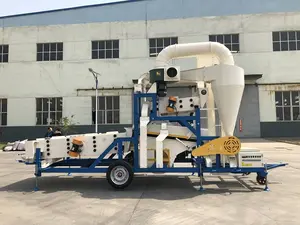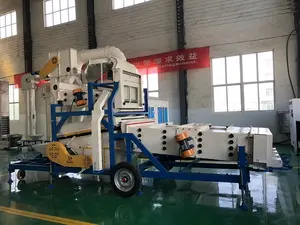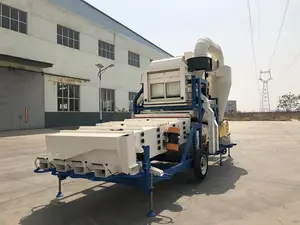
All categories
Featured selections
Trade Assurance
Buyer Central
Help Center
Get the app
Become a supplier

(3937 products available)













Market Overview: The global market for sorting machines, particularly those tailored for agricultural products like sesame, has exhibited robust growth. The Food Sorting Machines Market experienced an increase from USD 1.16 billion in 2023 to USD 1.23 billion in 2024, with a projected CAGR of 5.66% expected to reach USD 1.71 billion by 2030, according to 360iResearch™. This trend is echoed in the broader sorting machines sector, which is anticipated to grow from USD 4.49 billion in 2023 to USD 7.58 billion by 2030, at a CAGR of 7.74%. Such growth reflects the rising demand for efficient sorting solutions within the agricultural industry, driven by the need for quality assurance and the minimization of labor costs.
Industry Insights: The increasing focus on automation and technological advancements has significantly influenced consumer behavior in the sesame sorting machine market. Major players, such as Bühler AG and TOMRA Systems, are innovating to enhance sorting accuracy and efficiency, which is critical for maintaining quality in food processing. Furthermore, with the rise of e-commerce and changing distribution channel preferences, manufacturers are adapting their strategies to meet the demands of various markets. As consumers become more quality-conscious, the adoption of sorting machines that can ensure optimal product quality and reduce waste is expected to grow. These developments indicate a shift towards more automated solutions in the food industry, particularly in the sorting of sesame and similar agricultural products.
Sesame seed sorting machine comes in various configurations depending on the scale and precision required for sorting. The choice of machines therefore depends on your processing scale and sorting precision needs. Here are some of the most popular types of sesame sorting machines:
The gravity table sorter uses a vibrating table that inclines slightly to allow lighter seeds to move away from heavier impurities, such as stones or debris. Sesame seeds are spread onto the vibrating surface, where air flow separates seeds based on weight. This machine is ideal for medium to large operations needing bulk processing with good purity levels.
Color sorting machine for sesame seeds employs cameras and sensors to sort seeds based on color. This highly specialized machine removes discolored, damaged, or inferior seeds that may not be separated by other methods. It is particularly useful for achieving high levels of purity in premium quality markets. The machine is compact and suitable for small to large producers who require sorting according to visual characteristics.
The vibrating screen sorter separates seeds by size using screens with different mesh sizes. This machine removes foreign matter based on size rather than weight, effectively clearing debris like stones, dirt clods, and weed seeds. Its simplicity makes it easy to use, and it's well-suited for small to medium operations focusing on preliminary cleaning.
The gravity separator precisely removes lighter seeds from heavier ones using differential air streams and table inclines. This machine effectively separates high-density impurities like stones and low-density materials such as dust. Even very small size variations are detectable. It's a critical tool for large operations needing top-tier purity. Its high accuracy makes it valuable for producers who prioritize strict quality control.
Manufacturers offer these devices both separately and together. Combining several machines into a single line boosts cleaning power. The right setup depends on how many impurities there are and how pure the seeds must be.
Sesame sorting machines have key functions that help clean and classify sesame seeds well. Here are some main features:
Sorting accuracy refers to how well a machine can tell the difference between seeds of various sizes or colors. A sesame seed color sorter, for example, can sort seeds very precisely based on tiny differences in their colors.
Sesame seed sorter machine sorts seeds quickly while still sorting them accurately. This combination of sorting speed and accuracy is important for making sure the seeds that get through the process are all of the right quality.
A big capacity means the machine can handle a lot of seeds at once, which speeds up the sorting process. For larger farms or processing facilities, a machine with high capacity is necessary to sort all the sesame seeds efficiently.
However, smaller operations may not need such a large machine; one with lower capacity would be perfectly adequate. It's only important to have capacity that matches the needs of the business.
Some sorting machines can be adjusted to sort different types of seeds or grains, not just sesame seeds. This flexibility is useful for businesses that sort multiple products.
However, if a company only processes sesame seeds, a more specialized machine designed just for them will likely do the job better. Specialty sesame seed machines excel at maximizing sorting efficiency and cleanliness.
Laboratory machines need to be very resilient and durable since they work all day and night without any breaks. They should be made using strong materials and should have reliable construction so that they can easily sustain daily wear or strong shock.
Machines that are built with protective features like shields or covers also help keep them functioning well for several years. A tough, well-built sorter will require less routine maintenance and will remain in good working condition longer compared to weaker machines.
Sesame seed sorting machines help make food healthier and better for medicine, beauty products, and food manufacturing. Here are the details:
In food manufacturing, sesame seed sorting machines make sure seeds are clean, high quality, and free from dirt or bad seeds. This leads to safer, tastier foods like sesame oil, paste, and snacks.
Farmers use sorting equipment during harvest to separate good sesame seeds from waste. This saves farmers time and effort so they can focus on growing more crops.
Medicines need pure ingredients, too. Sorting machines help pharmaceutical companies find clean, sorted sesame seeds for making medicine. This ensures the medicine works properly without anything harmful inside.
Sesame seeds are used in lotions, oils, and other skincare products. Sorting machines prepare these seeds for use in cosmetic manufacturing. This leads to nicer creams and beauty products that are good for healthy skin.
Organic seed sorting also supplies nutrients and dietary supplements. It makes sure supplements contain only pure, sorted sesame seeds packed with vitamins and minerals.
For shipping large quantities, sesame seed sorting machines, like gravity separators, ensure the bulk shipments are uniform quality. This satisfies customer orders without worries about impurities or differences in condition.
Buyers should consider these factors when choosing a sesame seed sorting machine:
Different machines have various capacities. Gigantic machines are for large businesses, while small machines work for small groups. They should select a machine that fits their average production.
More advanced machines often cost more. However, cheaper models may lead to more work later. Businesses need to balance the immediate cost with long-term gains.
Some machines take up a lot of room, while others are more compact. Groups should have enough space for the machine they select.
Machines can use sight, touch, or weight to sort seeds. Each method has its own advantages. Farmers should choose the sorting tech that fits their needs.
Some machines need a lot of maintenance. It's important to consider the upkeep before choosing a machine. Those with fewer maintenance needs are often easier to work with over time.
Reviews on sorting machines are important to consider. Only trusted suppliers with good customer service records should be selected. They need to respond quickly to questions and provide support when needed.
Sorting machines are used daily, so the materials used to build them really matter. Buy machines made from strong, durable parts that can handle regular use. Machines that resist moisture, heat, and wear down over time are ideal since they won't need replacements as often.
A1: No, sesame machines are built to last and don't require a lot of maintenance. Simple machines just need regular cleaning to keep functioning well. Larger machines sometimes require maintenance, but they still perform the job for many years without any issues.
A2: Yes, these machines are meant to work hard for many years as long as they're taken care of. Strongly built machines that withstand dirt, humidity, and high temperatures tend to last the longest.
A3: They should do research online and consult others in the industry about their experiences. It helps to read reviews from other users about the machines they have. Talking with experts and distributors can also provide insight into which machines are the most dependable.
A4: Yes, recent innovations use machines that employ artificial intelligence, multi-spectral imaging, and vibration sorting table for sesame seeds to improve accuracy and speed. Newer machines are also becoming greener by using less energy and fewer emissions.